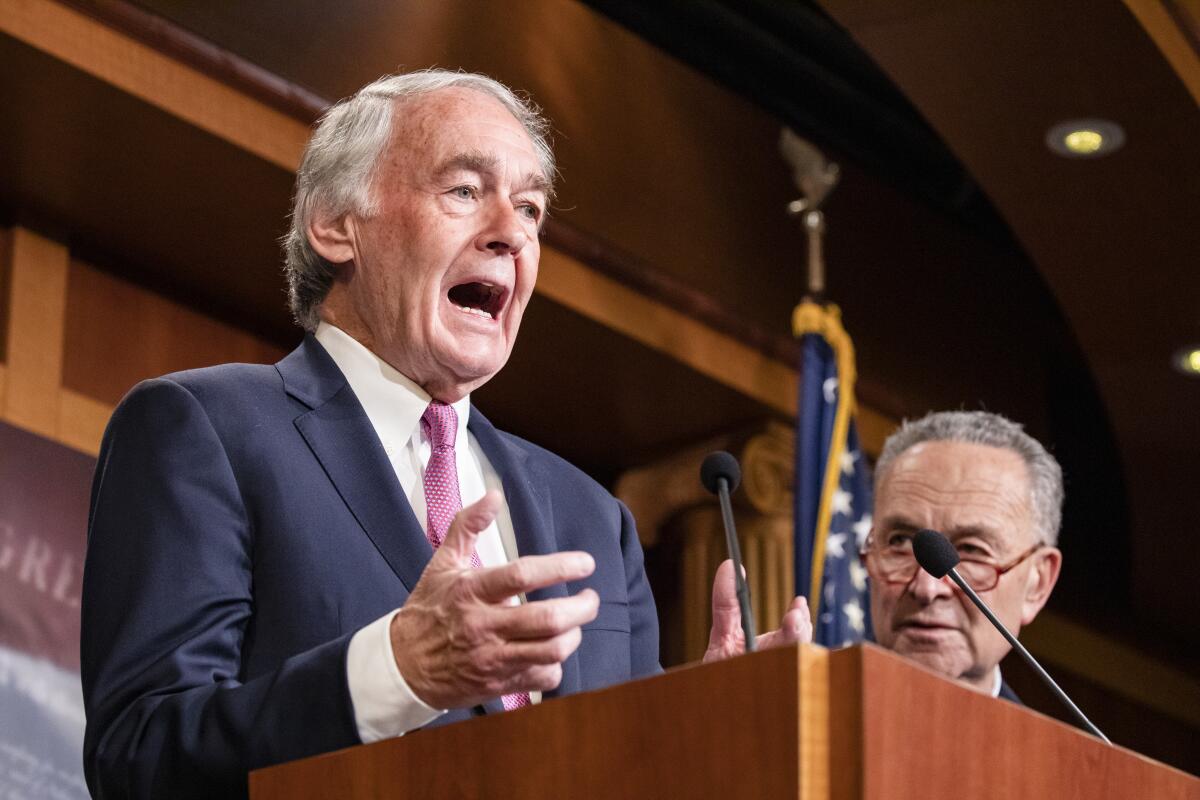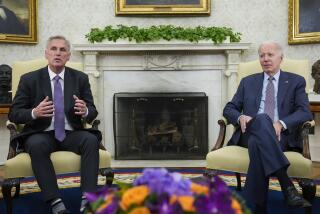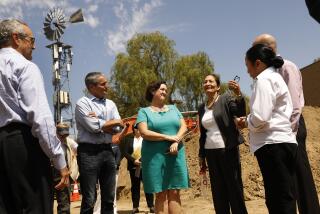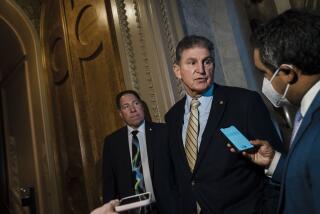Democrats intensify push for climate action in infrastructure bill

- Share via
WASHINGTON — Prospects for a bipartisan infrastructure bill are growing increasingly dim as Senate Democrats make new calls for President Biden to ditch Republicans and pursue a Democrats-only measure that aggressively addresses their priorities, including the climate crisis.
A handful of key progressives say they’re done negotiating. Sen. Bernie Sanders (I-Vt.) says the latest bipartisan plan — which amounts to about $579billion in new spending for roads and bridges — is a paltry substitute for what the nation needs.
Sens. Edward J. Markey (D-Mass.) and Jeff Merkley (D-Ore.) say they will oppose a bipartisan deal unless it comes with a guarantee of a follow-on bill to address the climate crisis.
Biden and Senate Republicans have been engaged in talks over a bipartisan plan to shore up the nation’s infrastructure for more than a month.
When talks with Sen. Shelley Moore Capito (R-W.Va.) fell apart, Biden moved on to another plan crafted by a small group of Republicans and Democrats. The latest proposal is backed publicly by only five Republicans — five short of the 10 GOP votes needed for passage, if all Democrats and independents are on board.
When an informal Memorial Day deadline passed without a deal, Democrats’ patience — already thin — evaporated. They want to achieve their legislative priorities while they can.
“President Biden has laid out a big, bold vision, and it is urgent,” said Rep. Pramila Jayapal (D-Wash.). “The next step is clear: Let’s do what the people are demanding. Let’s go big, bold and fast.”
Democrats know that their slight advantage in the Senate — which is split 50-50 with Vice President Kamala Harris serving as the tiebreaker for Democrats — can evaporate if a single Democrat leaves office. And they are increasingly worried about a poor outlook in the 2022 midterm election.
As the bipartisan talks have gone on, climate has emerged as a top priority for Democrats and a key reason they don’t want to keep pursuing a bipartisan plan.
Markey and Merkley have repeatedly said, “no climate, no deal,” meaning they would oppose a bill that doesn’t address the crisis. But they have not identified any specific climate policies that a bill needs to get their votes.
“What we’re asking for is to put together a set of policies that unleashes the wind and solar [industries], all-electric vehicle, plug-in hybrid, the battery storage technologies, the transmission systems, the changes in the agriculture and industrial sectors that will create millions of union jobs while at the same time ensuring that we have environmental justice,” Markey said.
He pointed to the climate policies in Biden’s original infrastructure proposal, but stopped short of saying that the exclusion of any single one would be a red line.
Biden’s proposal included sweeping measures to address climate change. The clean energy standard is a central plank of that plan, mandating that electric utilities generate 80% of their electricity from zero-carbon sources by 2030 and 100% by 2035.
The president had also called for $15 billion for 500,000 electric vehicle charging stations, which would make it easier for more drivers to ditch gas-powered cars. Other provisions would push the country toward clean energy for powering homes, factories and more. Tax credits for wind, solar and energy storage facilities would be extended for 10 years. All of the country’s electricity would be generated from carbon-free sources by 2035.
“This is a huge moment when we have the opportunity to make the types of changes necessary to finally address climate change in a meaningful way,” said Rep. Mike Levin (D-San Juan Capistrano).
Several other California Democrats have echoed the call to address climate policy in the infrastructure plan, regardless of whether Biden continues to negotiate with Republicans or pursues a Democrats-only bill. They include Sen. Alex Padilla and Reps. Nanette Barragán of San Pedro, Ro Khanna of Fremont and Jimmy Gomez of Los Angeles.
Progressive Democrats’ demands add to the challenge for Biden and Senate Majority Leader Charles E. Schumer (D-N.Y.) to get an infrastructure plan through the Senate. They could eschew the progressives and try to write a bill that gets the support of moderate Democrats and Republicans. But that plan would likely falter in the more progressive House.
Although Schumer said the separate track of bipartisan negotiations would also continue, work on the Democrats-only package is speeding up. Schumer is set to meet with Senate Budget Committee members Wednesday to discuss a budget, the first step of the process, by the beginning of July.
Schumer plans to instruct the committee to include funding for climate provisions, such as incentives to reduce electricity emissions by 80% by 2030, rebates for “clean” vehicles and agricultural industry incentives, according to a Democratic aide.
There are downsides to a Democrats-only bill, also. Biden, Schumer and House Speaker Nancy Pelosi (D-San Francisco) would need nearly every Democratic vote.
The process of passing a Democrats-only bill that doesn’t allow for a GOP filibuster is rife with challenges. Policies have to be directly related to the budget to stay in such a bill, meaning some would likely be scrapped.
White House officials told House Democrats on Tuesday that they would give the bipartisan talks an additional week to 10 days to show results, said Rep. John Yarmuth (D-Ky.), chair of the Budget Committee, which would be tasked with starting the process of enacting a Democrats-only bill.
Times staff writer Chris Megerian contributed to this report.
More to Read
Get the L.A. Times Politics newsletter
Deeply reported insights into legislation, politics and policy from Sacramento, Washington and beyond. In your inbox twice per week.
You may occasionally receive promotional content from the Los Angeles Times.











